
Content medically reviewed by Vicky Magobet, PMHNP-BC, on July 22, 2019.
Eating a well-balanced diet is seldom mentioned when people talk about addiction recovery. This diet change along with adequate sleep and exercise will increase the "feel good" hormones your body produces, making for a quick and successful recovery. Since addiction can alter a person's diet, proper nutrition and some dietary changes are required for anyone recovering from an addiction. Some of these changes follow.
Your body needs a sufficient supply of nutrients for you to remain healthy and strong. Nutrients are divided into two basic categories:
You need to ensure that you’re receiving an adequate supply of the following nutrients from healthy sources:
To ensure that your brain receives enough nutrients to work properly, your treatment program dietitian will recommend a healthy meal plan. The meal plan will vary depending on the type of substance abuse you’re recovering from. For instance, if you’re not eating adequately and you’re underweight, you’ll need to eat food that is rich in healthy carbohydrates and fats so that you can gradually receive enough calories.
When you’re in the recovery stage, you need to start preparing your own meals. Preparing healthy meals is a great habit that will help your mind stay focused and keep you energized.
Many clients gain weight during detox. One of the reasons is that as drugs leave the blood and tissues, the appetite tends to increase. You need to keep track of your weight to stay healthy. In addition, avoid eating fast food as a means for satisfying your cravings.
Eat food that has adequate dietary fiber, including vegetables and whole fruit. This lifestyle will keep you full longer and prevent binge eating. Also, stay hydrated and try to carry a water bottle with you when you go outdoors. Remember that dehydration can lead to confusion, irritability and dizziness. It also hinders a person's ability to exercise self-control.
If you’re at a detox or addiction treatment facility like Diamond House Detox, you'll need to adopt some nutrition changes for addiction recovery. A dietitian will provide you with a structured meal plan, and you'll be served three main meals: breakfast, lunch and dinner. You’ll also have snacks — one between breakfast and lunch, one between lunch and dinner and one late night snack.
After you leave the facility, you must continue to follow our dietitian’s recommendations. Eat fruit and vegetables with each meal, and follow your meal plan as closely as possible to hasten the process of recovery.
If you need more information about nutritional changes for addiction recovery, contact us at Diamond House Detox today. We run a certified rehab and addiction recovery facility with a team of medical practitioners, including doctors and nurses who provide incidental medical services. Any client who needs injectable medicine can receive it on-site at our facility. Reach out now to get started.